Recent Events
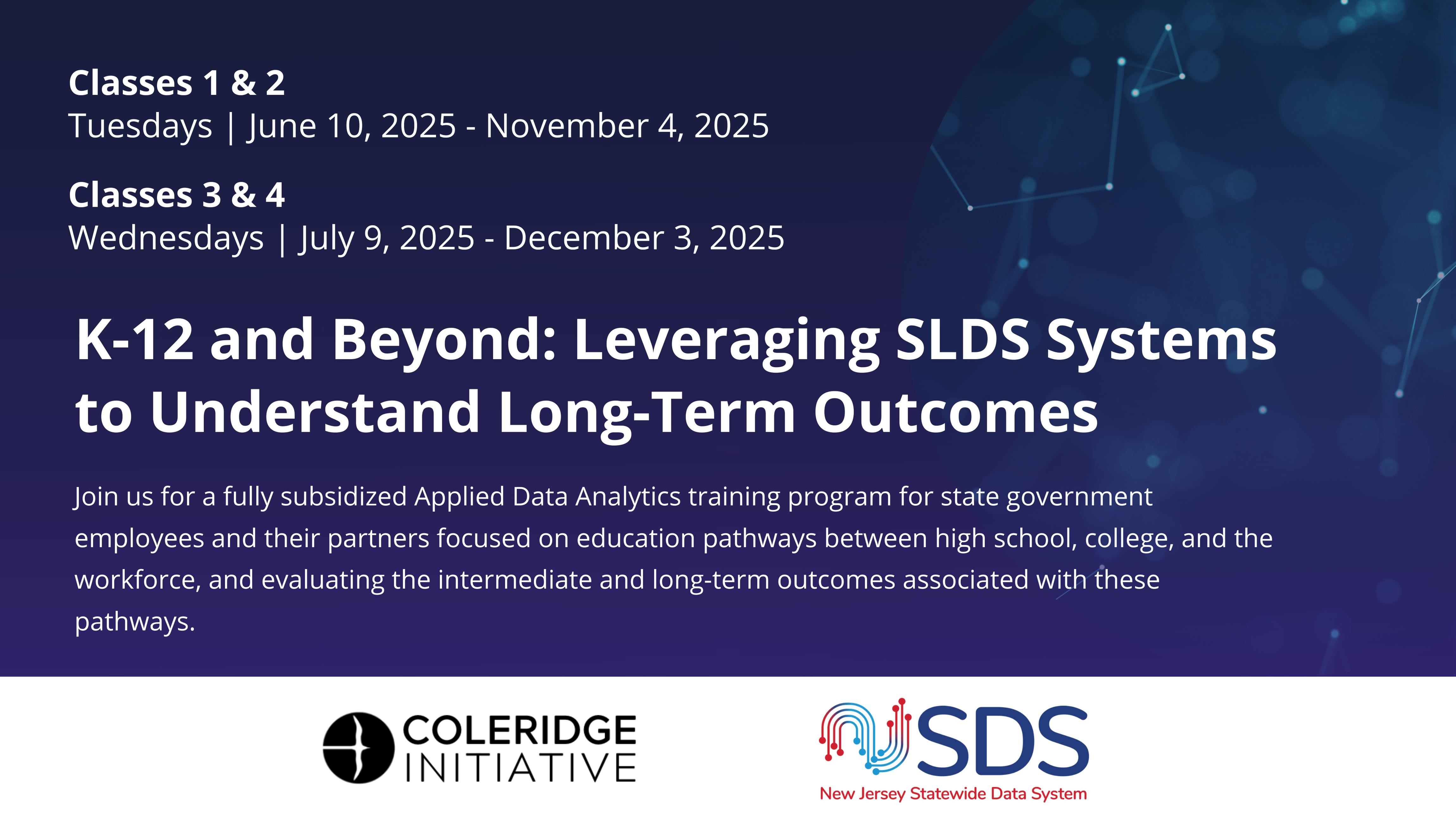
10 Jun 2025
K-12 and Beyond: Leveraging SLDS Systems to Understand Long-Term Outcomes
The Coleridge Initiative will deliver four fully subsidized Applied Data Analytics training programs for state government employees and their partners focused on education pathways between high school, college, and the workforce, and evaluating the intermediate and long-term outcomes associated with these pathways. The classes will be developed in partnership with the State of New Jersey, using the New Jersey Statewide Data System, and are supported by the Walton Family Foundation and the Gates Foundation.
Application Deadline Extended to June 6, 2025 Watch the recording of the Introductory Webinar to learn more about the classes. Overview The Coleridge Initiative will deliver four fully subsidized Applied Data Analytics training programs for state government employees and their partners focused on education pathways between high school, college, and the workforce, and evaluating the intermediate and long-term outcomes associated with these pathways. The classes will be developed in partnership with the State of New Jersey, using the New Jersey Statewide Data System, and are sponsored by the Walton Family Foundation and Bill & Melinda Gates Foundation. Accepted class participants will learn and apply data analytic approaches such as record linkage, measurement creation, and data visualization to restricted-use linked K-12, postsecondary, and workforce data provided by the State of New Jersey and accessed inside the Coleridge Initiative’s award-winning Administrative Data Research Facility (ADRF). Prospective participants are expected to apply as project teams (more in the following section), and should not plan on providing their own data as part of the training. The first two programs will begin on June 10, 2025, and the latter two will begin on July 9, 2025. The courses are designed with the understanding that it is difficult for state agency staff to make time for professional development, and participants are expected to devote no more than 2 to 4 hours a week to the endeavor. More information on the schedule is available below. Application Information State teams should consist of four to six participants, with at least two having strong programming skills (ideally in R and/or SQL). Teams should feature participants from multiple state agencies or partners, and priority will be given to teams that apply with a designated team lead embedded within the work capable of facilitating team discussions and overseeing and guiding the project development—we believe this setup will contribute to further advancement of the work following the completion of the training. The team lead does not count as one of the 4-6 members of the participating team. Accommodations for individual participants or state teams unable to meet the requirements are encouraged to email training@coleridgeinitiative.org noting their interest. Teams only need to submit one application. As part of the application, the following information will need to be provided for each applicant: A recent resume or CV. A statement describing how their participation supports their professional development. A statement from their supervisor describing how participation will support their organization in the near and long-term future and confirming that they will be able to dedicate sufficient time to the training. Team leads will need to provide a recent resume or CV and a personal statement describing why they are well-suited to support the work as a team lead. All personal and supervisor statements should be no longer than one page. Teams will also be asked to indicate a preference for the class they would like the team to attend, and can respond with “no preference.” The deadline to submit applications is June 6, 2025. Schedule Class sessions will occur at most once a week, with breaks for federal holidays. Classes 1-4 will contain the same content. Please choose the class series that works best with your schedule. Classes 1 and 2: June 10 - November 18 Classes 1 and 2 Kickoff: June 10, 1:00 PM (1 hour) Module 1, Foundations of Data and Technical Literacy: June 17, 24 and July 1, 8 (1 hour each) at 1:00 PM. Module 2: July 15, 22, 29, August 5, 12, 19, 26, September 9, 16, 23, 30, and October 7 (2 hours each). Classes occur from 10:00 AM-12:00 PM or 2:00 PM-4:00 PM, depending on class selection 1 or 2. Self-Paced Project Work with Team: October 8-November 4 Final presentations: November 18 Classes 3 and 4: July 9 - December 3 Classes 3 and 4 Kickoff: July 9, 1:00 PM (1 hour) Module 1, Foundations of Data and Technical Literacy: July 16, 23, 30, and August 6 (1 hour each) at 1:00 PM. Module 2: August 13, 20, 27, September 10, 17, 24, October 1, 8, 15, 22, 29, and November 5 (2 hours each). Classes occur from 10:00 AM-12:00 PM or 2:00 PM-4:00 PM, depending on class selection 3 or 4. Self-Paced Project Work with Team: November 6-December 2 Final presentations: December 3
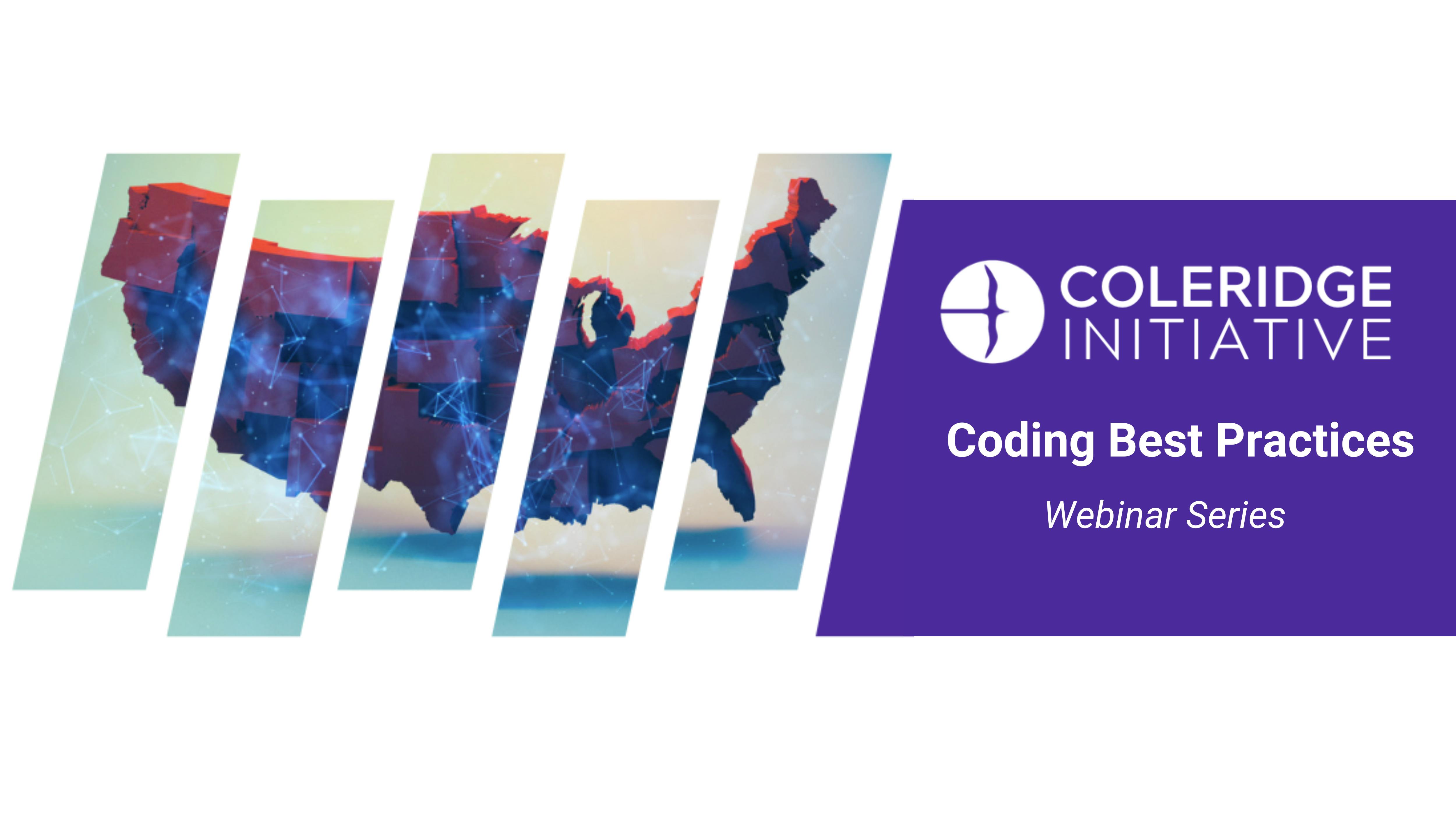
04 Jun 2025
ADRF User Community
Collaboration is essential to impactful research. Join Coleridge Initiative leaders for an interactive meeting on June 4, from 12:00 - 1:00 PM ET, to learn about tools available in the ADRF to accelerate working together and increase efficiency. This session is designed for current ADRF users and will highlight built-in collaboration tools available within the ADRF, share practical tips for working efficiently with partners across agencies and institutions, and offer guidance on maximizing research coordination in a secure environment.
A platform for users to collaborate, shape ADRF improvements, and foster a community of practice by: Sharing Knowledge – Building community events and a resource hub to support common best practices. Problem-Solving – Identifying and resolving data or technology challenges. Enhancing ADRF – Providing user-driven feedback to improve features and services. About The Coding Best Practices Series: Effective data analysis requires both a strong understanding of the programming language needed to complete the analysis and adherence to coding best practices that ensure efficiency, scalability, and maintainability. In these series, we will delve into the essential best practices for coding in modern data analysis, with a specific focus on the Administrative Data Research Facility (ADRF). The series will offer insights on how to optimize coding practices to make data accessible and understandable for policymakers. From code modernization efforts to enhancing the user experience for ADRF users, we will explore various strategies to improve the utilization of the platform. Materials from the previous online community events (Coding in R, RStudio, version control in Git and Coding in SQL, DBeaver, and memory management) are available inside the ADRF. Examples of coding best practices reference materials include: Video on creating database diagram in DBeaver Writing robust code and organizing code checklist Video on creating R package with functions, testing, automated documentation Video on using code snippets in RStudio OpenAI API code in Python Coding best practices for modern data analysis (recording, slide deck) Coding in R/RStudio and version control in Git (recording, slide deck, resources) Coding in SQL, DBeaver, and memory management (recording, slide deck, resources) Please reach out to community@coleridgeinitiative.org for more information about accessing these materials.
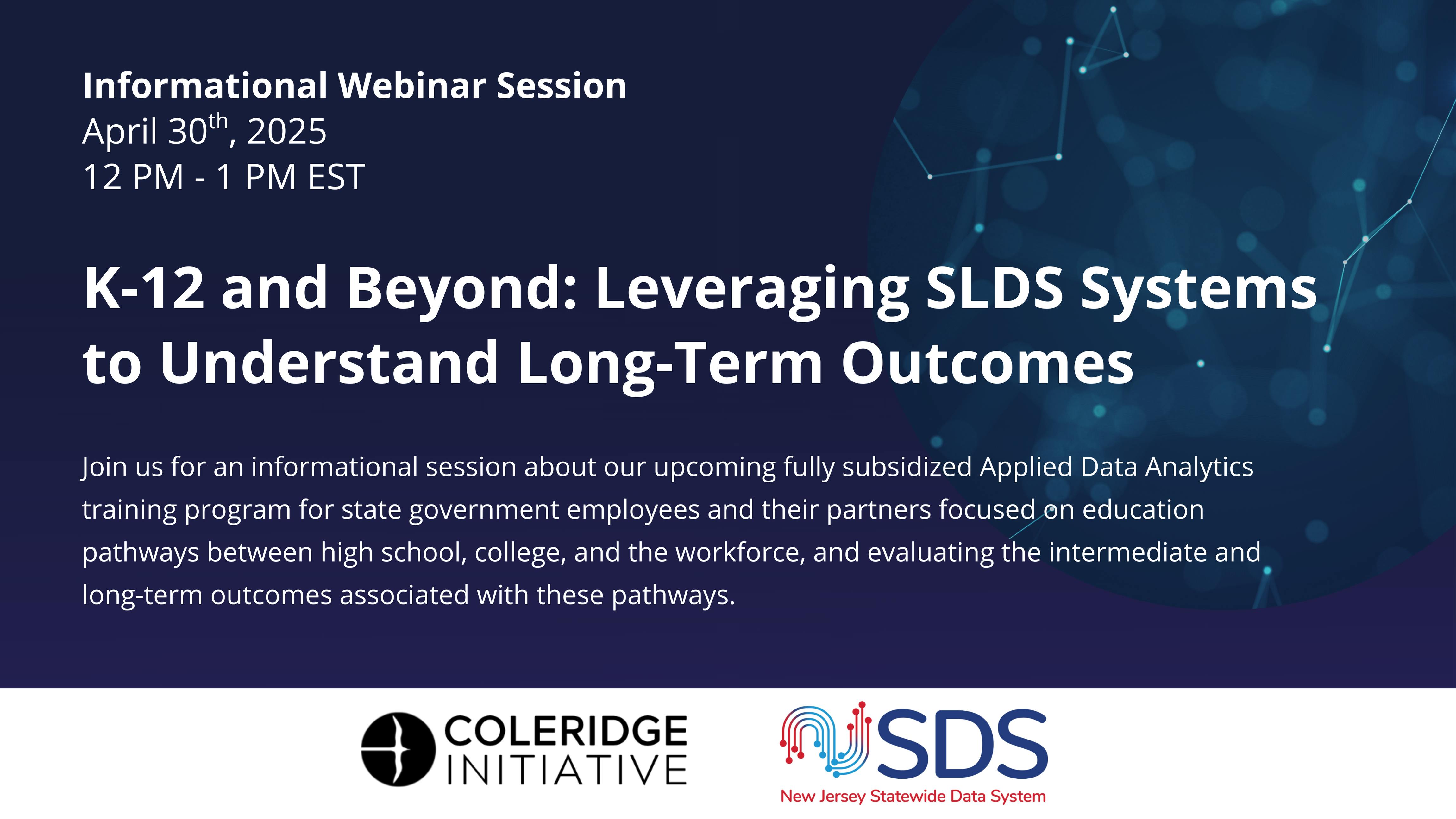
30 Apr 2025
Informational Webinar: K-12 and Beyond: Leveraging SLDS Systems to Understand Long-Term Outcomes
The Coleridge Initiative will deliver four fully subsidized Applied Data Analytics training programs for state government employees and their partners focused on education pathways between high school, college, and the workforce, and evaluating the intermediate and long-term outcomes associated with these pathways.
The Coleridge Initiative will deliver four fully subsidized Applied Data Analytics training programs for state government employees and their partners focused on education pathways between high school, college, and the workforce, and evaluating the intermediate and long-term outcomes associated with these pathways. The classes, each of which will feature the same content on different days and time slots, will be developed in partnership with the State of New Jersey, using the New Jersey Statewide Data System, and will feature the state’s restricted-use linked K-12, postsecondary, and workforce data. In this webinar, attendees will learn more about this opportunity and the application process.
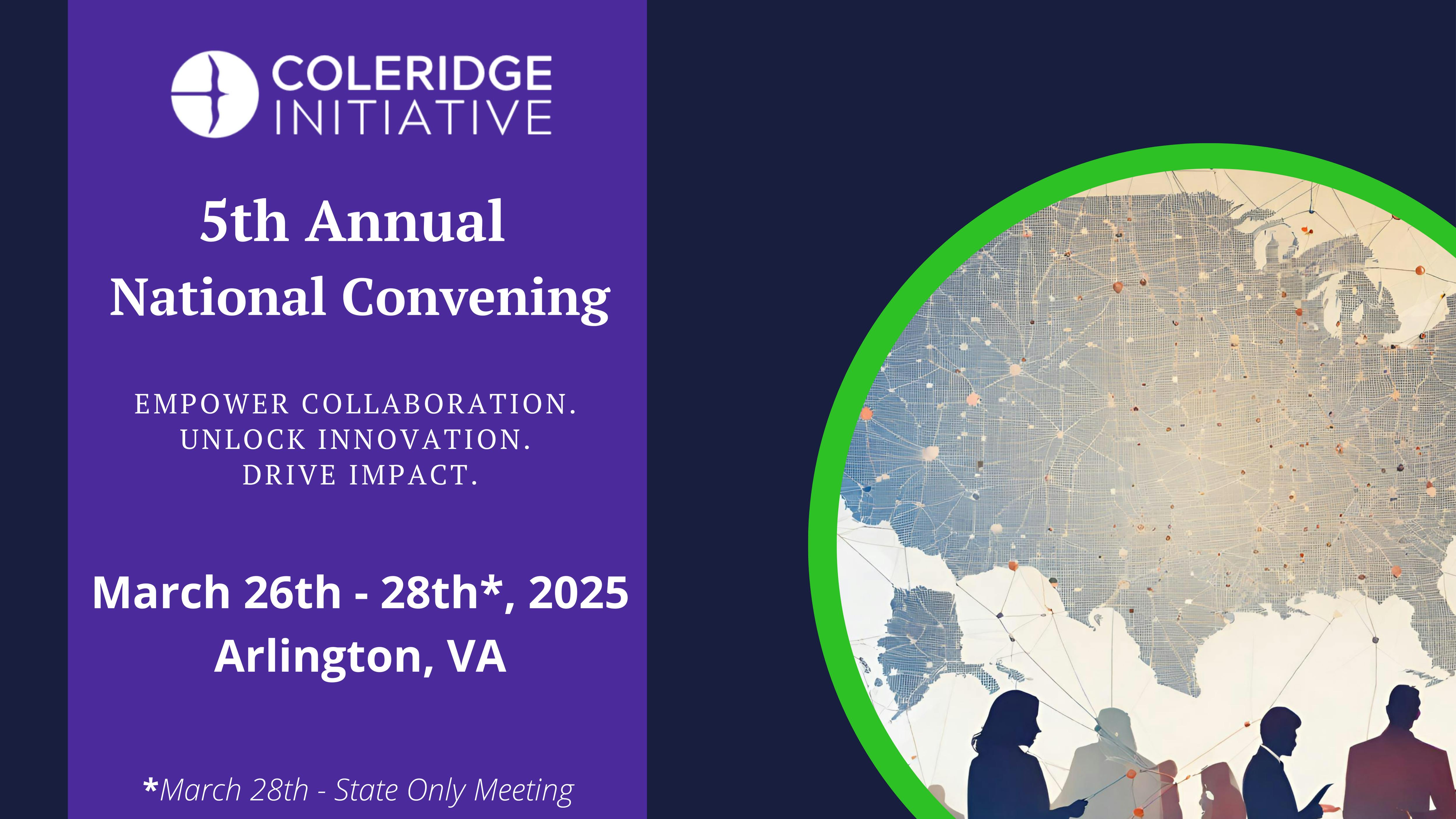
26 Mar 2025
5th Annual National Convening: Empower Collaboration. Unlock Innovation. Drive Impact.
Join us for the 5th Annual National Convening in Arlington, VA, on March 26–28*, 2025. Registration is now open—secure your spot today to explore data-driven solutions and strategic partnerships that shape public policy. Early bird pricing ends February 10th. Government employees attend free.
In today’s data-driven world, the successful design of government policies and practices relies heavily on strategic collaboration between data partners. Coleridge Initiative’s Annual Convenings are designed to showcase the transformative potential of leveraging administrative data through state, federal, and private collaborations. As we celebrate the 5th Anniversary of this convening, we will highlight how strategic partnerships across state, federal, and private sectors are unlocking the potential of administrative data to drive meaningful change in public policy. Some of the highly anticipated sessions include: Keynote Address by Mark Zandi, Chief Economist, Moody’s Empowering Collaboration across the Public and Private Sectors Empowering Data Innovation to Drive Opportunity and Access in Higher Education Unlocking Responsible Artificial Intelligence Uses with State and Federal Data Collaborating on Best Practices for Data Sharing, Governance, and Infrastructure Sessions highlighting recent work within the DDC, ADA Training, ADRF User Community and MSDC RFI projects are also included in the agenda Multi-State Data Collaborative Partners Only (MSDC): The Multistate Data Collaborative annual meeting will begin Thursday afternoon, March 27th into Friday morning, March 28th We invite you to join us for this exciting event and discover how we can work together to leverage data for the public good. *Note that the afternoon of March 27th and the morning of March 28th will be dedicated to focused meetings with partners in the MSDC. The MSDC Annual Meeting is exclusively for participating or interested state agencies and their policy research partners.
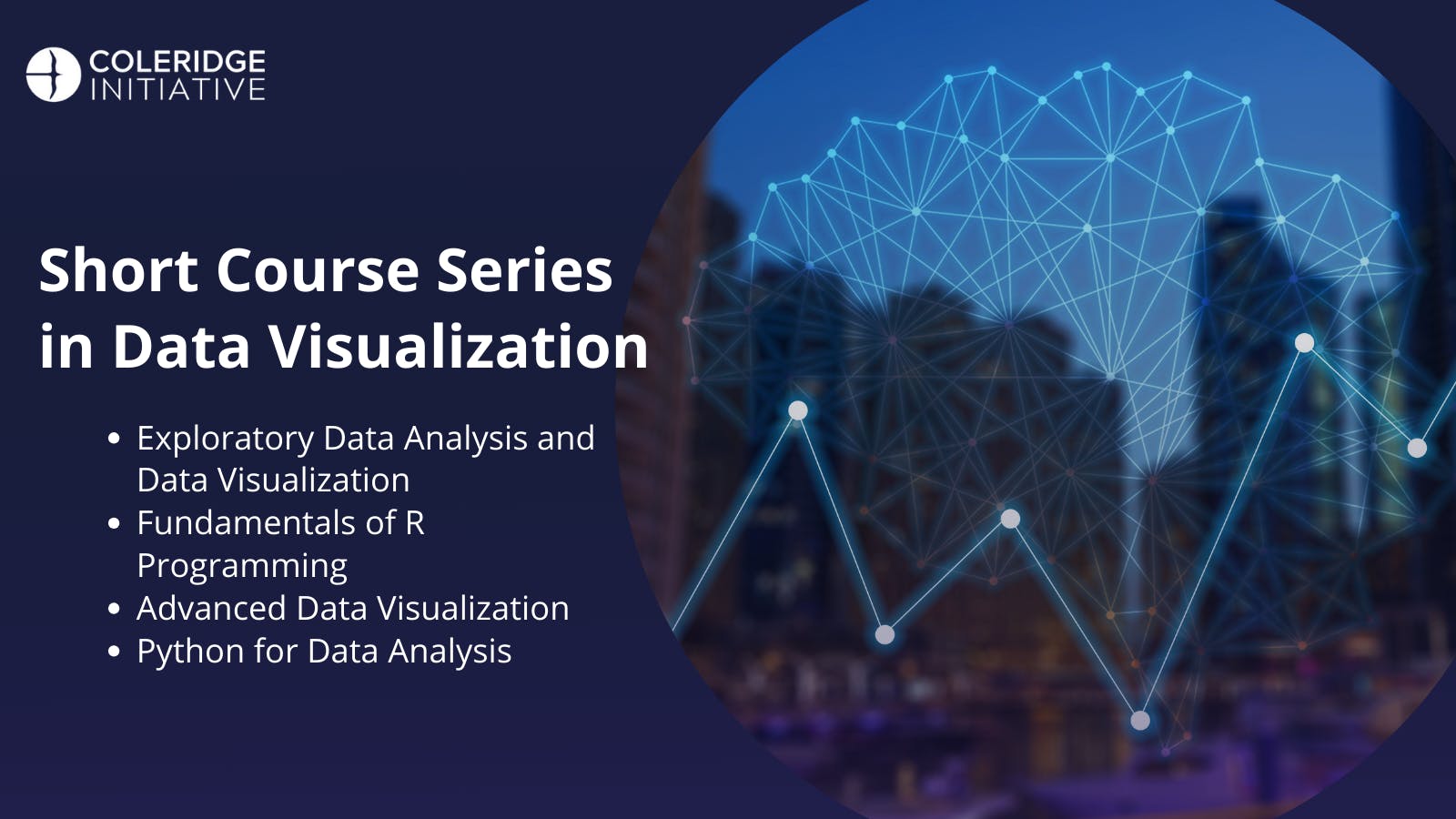
25 Jan 2025
R Programming: Basic
The R Programming: Basic course will provide participants with fundamental knowledge of the R programming language for working with multiple types of data, reproducible research, data manipulation, and reporting.
Participants in the course will have the opportunity to explore synthetic microdata, based on commonly used administrative data, using the Rstudio development environment and tools from the tidyverse suite of R packages within the ADRF secure data environment. Topics include R data types and their manipulation using the tidyverse, project usage, data management, and using R for reporting and constructing publication-quality output and reports. Upon completion of this short course, participants will have exposure and experience with core elements of the R programming language, and experience using R for fundamental data analysis and reporting tasks, preparing them for more advanced coursework in applied data analytics. Tuition for this course is $1,000. This course is only available to applicants in the United States. This course has no prerequisites and is offered 2-3 times per year. The next course will begin January 24, 2025, with classes meeting on Fridays from 12:00 PM to 2:00 PM EST and optional office hours on Mondays from 1:00 PM to 2:00 PM EST.

18 Oct 2024
Advanced Data Visualization
The Advanced Data Visualization course will provide participants with advanced tools for the creation of data visualizations using the R programming language.
Participants in the course will have the opportunity to explore confidential microdata using the Rstudio development environment and tools from the tidyverse suite of R packages within the ADRF secure data environment. Topics include customization of ggplot objects, advanced visualization techniques and geometries, mapping of spatial data, creation of animations and interactive plots, and an introduction to Shiny apps. Upon completion of this short course, participants will be able to produce customized visualizations of a variety of different data types, as well as interactive visualization tools. Tuition for this course is $1,000. This course is only available to applicants in the United States. The prerequisite for this course is Exploratory Data Analysis and Visualization. This course is offered 1-2 times per year. The next class will be held on October 18 - November 15, 2024, with classes meeting on Fridays from 12:00 PM to 2:00 PM EST and optional office hours on Mondays from 1:00 PM to 2:00 PM EST.
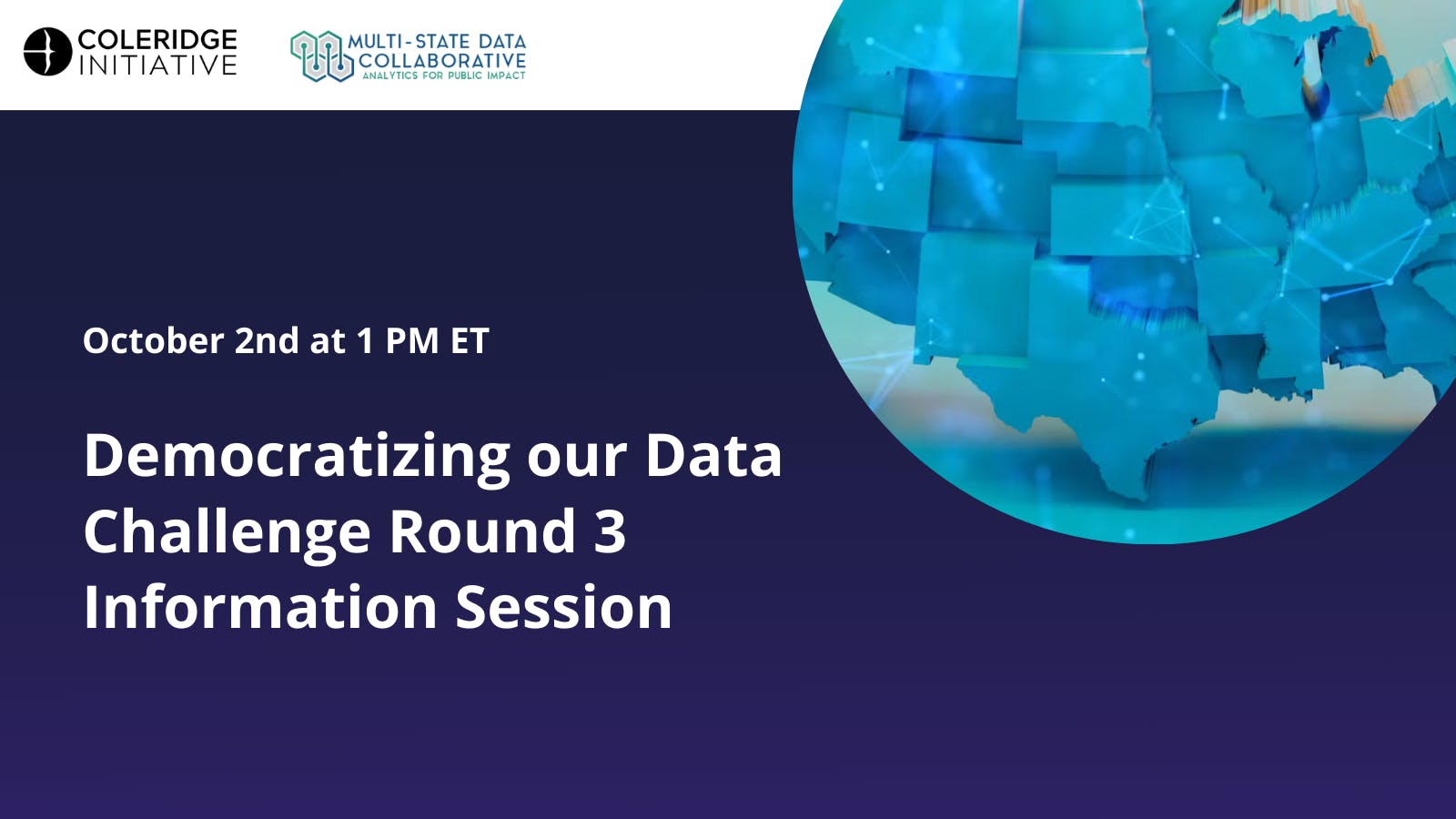
02 Oct 2024
Democratizing our Data Challenge Round 3 Information Session
Join the Coleridge Initiative and the Multi-State Data Collaborative on October 2nd, 2024 at 1 PM ET to learn more about the Democratizing our Data Challenge Round 3 opportunity and how to apply.
The successful design of government policies and practices relies heavily on strategic collaboration between data partners. The Coleridge Initiative’s Democratizing our Data Challenge has enabled the collaboration of multi-partner teams from across the United States to expand existing data products developed in the Administrative Data Research Facility (ADRF) and develop new data linkages, dashboards, portals, APIs, data models, and code repositories. Through the Challenge, we have gained invaluable insights and experience in data-sharing agreements, multi-partner collaboration, secure technology, data governance and compliance, and data infrastructures. In this webinar session, we will provide an overview of the Democratizing our Data Challenge and discuss how to apply for Round 3 of the Challenge.
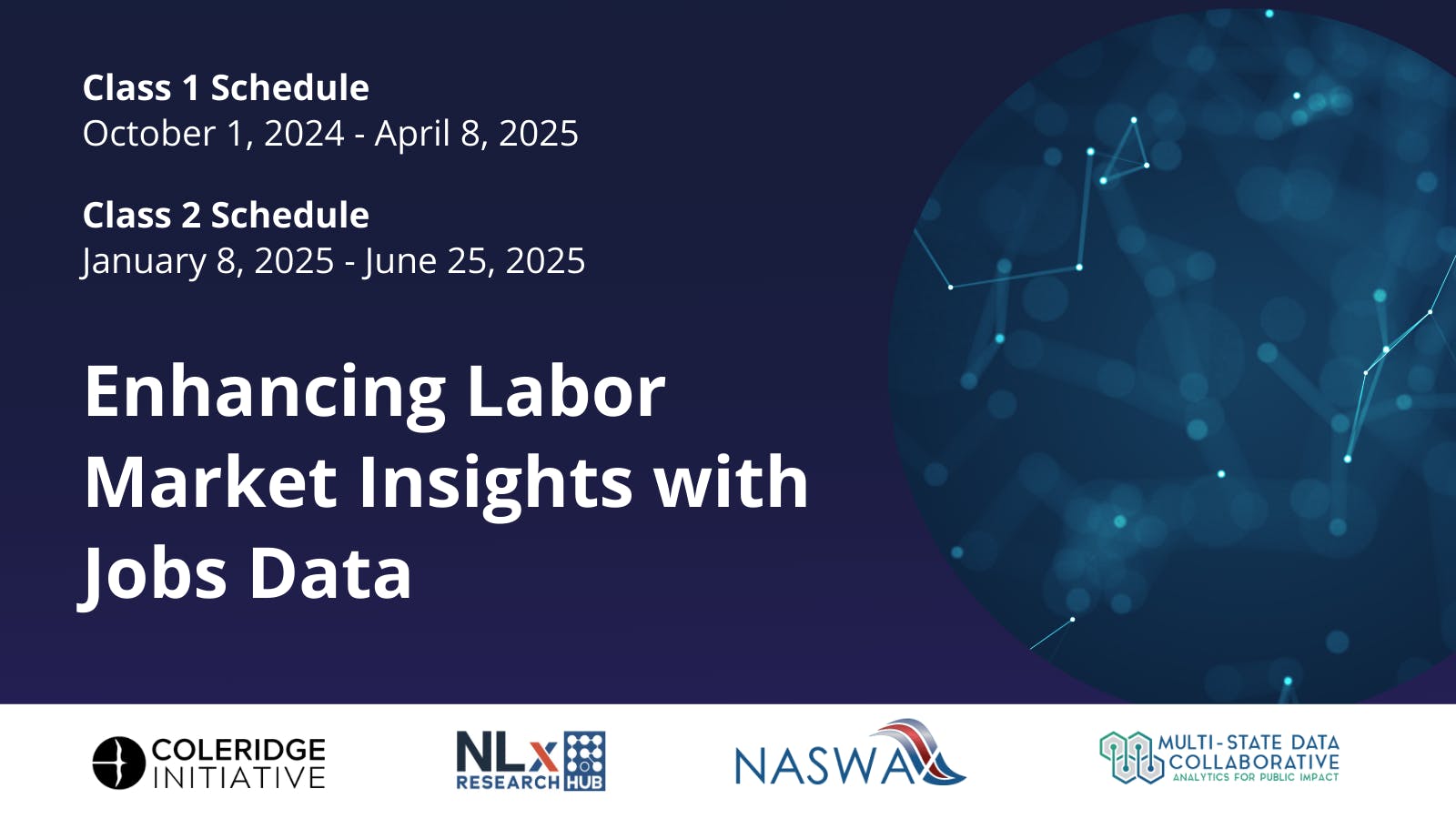
01 Oct 2024
Enhancing Labor Market Insights with Jobs Data
Join one of Coleridge Initiative's upcoming fully-funded Applied Data Analytics Training Program. Participants will work with the NLx Research Hub jobs data and a synthetic dataset based on linked state postsecondary and workforce administrative data inside the Coleridge Initiative’s Administrative Data Research Facility (ADRF).
Overview In partnership with the National Association of State Workforce Agencies (NASWA) and the National Labor Exchange (NLx) Research Hub, the Coleridge Initiative will be delivering a training program focused on job demand data use and how to align it to skills and credentials in state administrative data. The course will be offered in October 2024 and January 2025. By the end of the course, participants will have the tools and experience necessary to create data products and actionable insights that: Enhance existing LMI efforts such as occupational forecasts through supplements to traditional sources of labor market data. Better communicate the changing needs of labor markets across the nation. More effectively examine how skills and credential attainment align to job demand by industry, geography—such as subregion, metro classification, and state—and worker characteristics. The Coleridge Initiative, NASWA, NLx Research Hub, and Multi-State Data Collaborative teams will host a webinar about this training opportunity and the application process on August 26, 2024 at 1 PM EST. The recording and slide deck from the webinar session will be uploaded to this webpage once they are available. Participants in the training program will have the opportunity to work with the NLx Research Hub jobs data and a synthetic dataset based on linked state postsecondary and workforce administrative data inside the Coleridge Initiative’s Administrative Data Research Facility (ADRF). The first class will begin on October 1, 2024, and the second class will begin on January 8, 2025. The program is designed with the understanding that it is difficult for state agency staff to make time for professional development, and participants are expected to devote no more than 2 to 4 hours a week to the endeavor. Application Information Teams from states new to ADA training, the ADRF, or NLx data, as well as those with experience are both encouraged to apply. State teams should consist of 2-3 participants, with at least one member from a state agency who is part of the workforce system, and others from state education and economic development agencies or local workforce boards. At least one participant should have strong programming skills. Priority will be given to teams that satisfy these requirements. As part of the application, the team lead will need to provide the following for each applicant: A recent resume or CV. A statement describing how their participation will increase the amount of actionable labor market information in the U.S. to support the recruitment, hiring, and training opportunities of all workers to good jobs. A statement from their supervisor describing how participation will support their agency in the near and long-term future. The team lead will also be asked to indicate a preference for the class they would like the team to attend, and can respond with “no preference.” Schedule Class sessions will occur at most once a week, with breaks for federal holidays. Class 1 Schedule: October 1, 2024 - April 8, 2025 1:00 PM EST, Tuesdays Kickoff: 10/1/24 (1 hour) Module 1 (Foundations): 10/8, 10/15, 10/22, 10/29 (1 hour each) Module 2: 11/5, 11/12, 11/19, 12/3, 12/10, 12/17, 1/7, 1/14, 1/21, 1/28, 2/4, 2/18 (2 hours each) Self-Paced Project Work w/ Team: 2/19 - 4/7/2025 Final Presentations: 4/8/25 (approximately 3.5 hours) Class 2 Schedule: January 8, 2025 - June 25, 2025 1:00 PM EST, Wednesdays Kickoff: 1/8/25 (1 hour) Module 1 (Foundations): 1/15, 1/22, 1/29, 2/5 (1 hour each) Module 2: 2/19, 2/26, 3/5, 3/12, 3/19, 4/2, 4/9, 4/16, 4/23, 4/30, 5/7, 5/14 (2 hours each) Self-Paced Project Work w/ Team: 5/15 - 6/24/2025 Final Presentations: 6/25/25 (approximately 3.5 hours)

13 Sep 2024
Python for Data Analysis
The Python for Data Analysis course will provide participants with an understanding of Python packages for applied data analysis.
Participants in the course will have the opportunity to explore confidential microdata using the Rstudio development environment and tools from the pandas and polars Python packages within the ADRF secure data environment. Topics include data access, manipulation, and summarization as well as coverage of data visualization using the matplotlib and seaborn packages. Upon completion of this short course, participants will have introductory exposure to tools that are applicable to a wide variety of research settings and that will prepare them for more advanced coursework in applied data analytics. Tuition for this course is $1,000. This course is only available to applicants in the United States. This course has no prerequisites and is offered 3-4 times per year. The next session will be held from September 13 to October 11, 2024, with classes meeting on Fridays from 12:00 PM to 2:00 PM EST and optional office hours on Mondays from 1:00 PM to 2:00 PM EST.
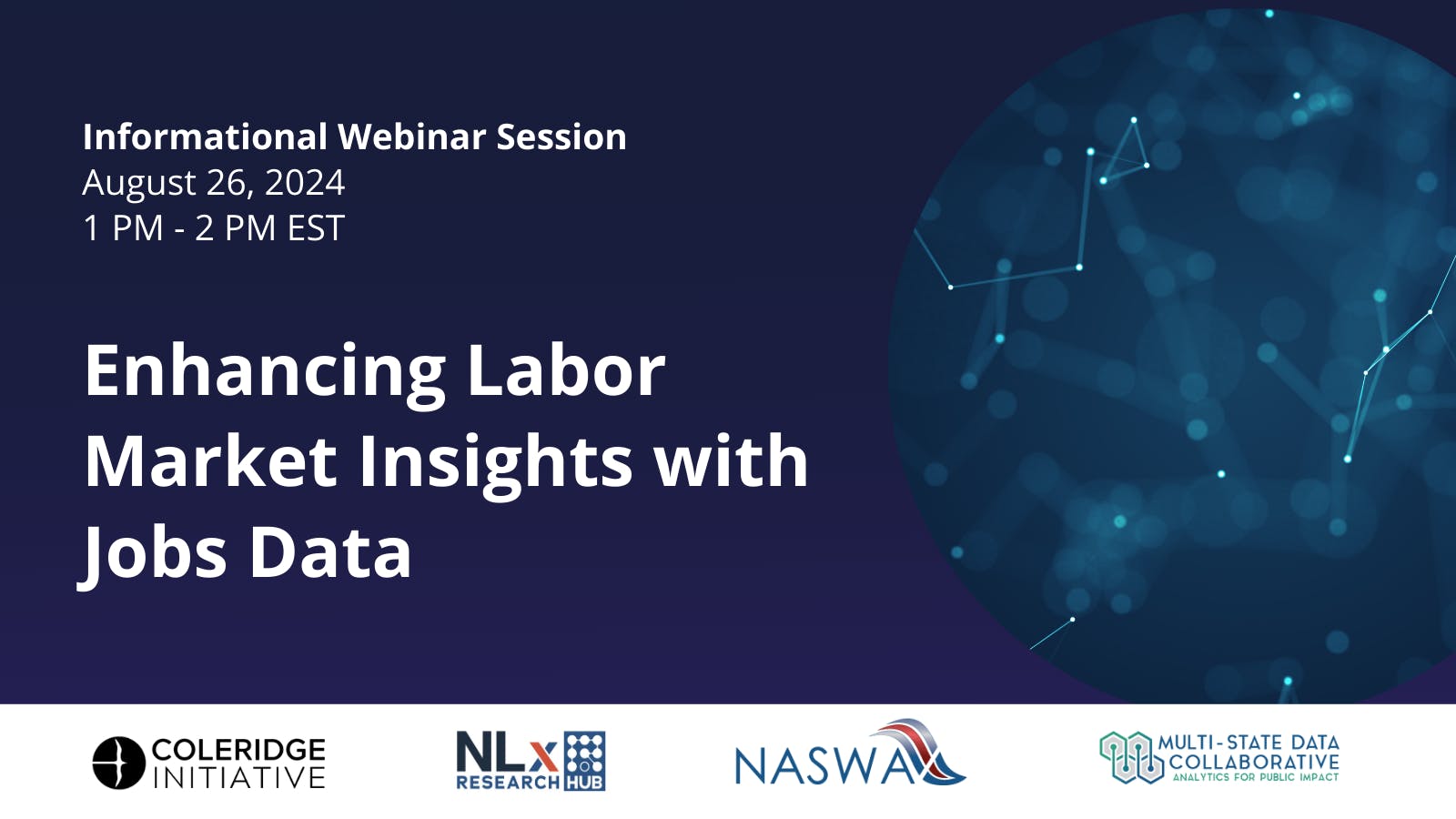
26 Aug 2024
Informational Webinar: Enhancing Labor Market Insights with Jobs Data
Join the Coleridge Initiative, the National Association of State Workforce Agencies (NASWA), the National Labor Exchange (NLx) Research Hub, and the Multi-State Data Collaborative (MSDC) to learn more about the two upcoming fully-funded Applied Data Analytics training programs.
We are excited to announce a fully-funded training program, developed in collaboration with the National Association of State Workforce Agencies (NASWA), the National Labor Exchange (NLx) Research Hub, and the Multi-State Data Collaborative (MSDC), focusing on job demand data use and aligning it with skills and credentials in state administrative data. The training will be offered in both October 2024 and January 2025. Participants will have the opportunity to work with the NLx Research Hub jobs data and a synthetic dataset based on linked state postsecondary and workforce administrative data inside the Coleridge Initiative’s Administrative Data Research Facility (ADRF). Join us for this webinar to learn more about this unique training opportunity and the application process.

19 Jul 2024
Exploratory Data Analysis and Data Visualization
The Exploratory Data Analysis (EDA) and Data Visualization course will introduce participants to applied data analysis and data visualization using R Programming language.
This course is a modern introduction to applied data analysis and data visualization using the R programming language. Participants in the course will have the opportunity to explore confidential microdata using the Rstudio development environment and tools from the tidyverse suite of R packages within the ADRF secure data environment. Topics include data access, manipulation, and summarization as well as coverage of data visualization using the ggplot2 package. Upon completion of this short course, participants will have introductory exposure to tools that are applicable to a wide variety of research settings and that will prepare them for more advanced coursework in applied data analytics. Tuition for this course is $1,000. This course is only available to applicants in the United States. This course has no prerequisites and is offered 3-4 times per year. The next class will be held in 2025, with classes meeting on Fridays from 12:00 PM to 2:00 PM EST and optional office hours on Mondays from 12:00 PM to 2:00 PM EST.
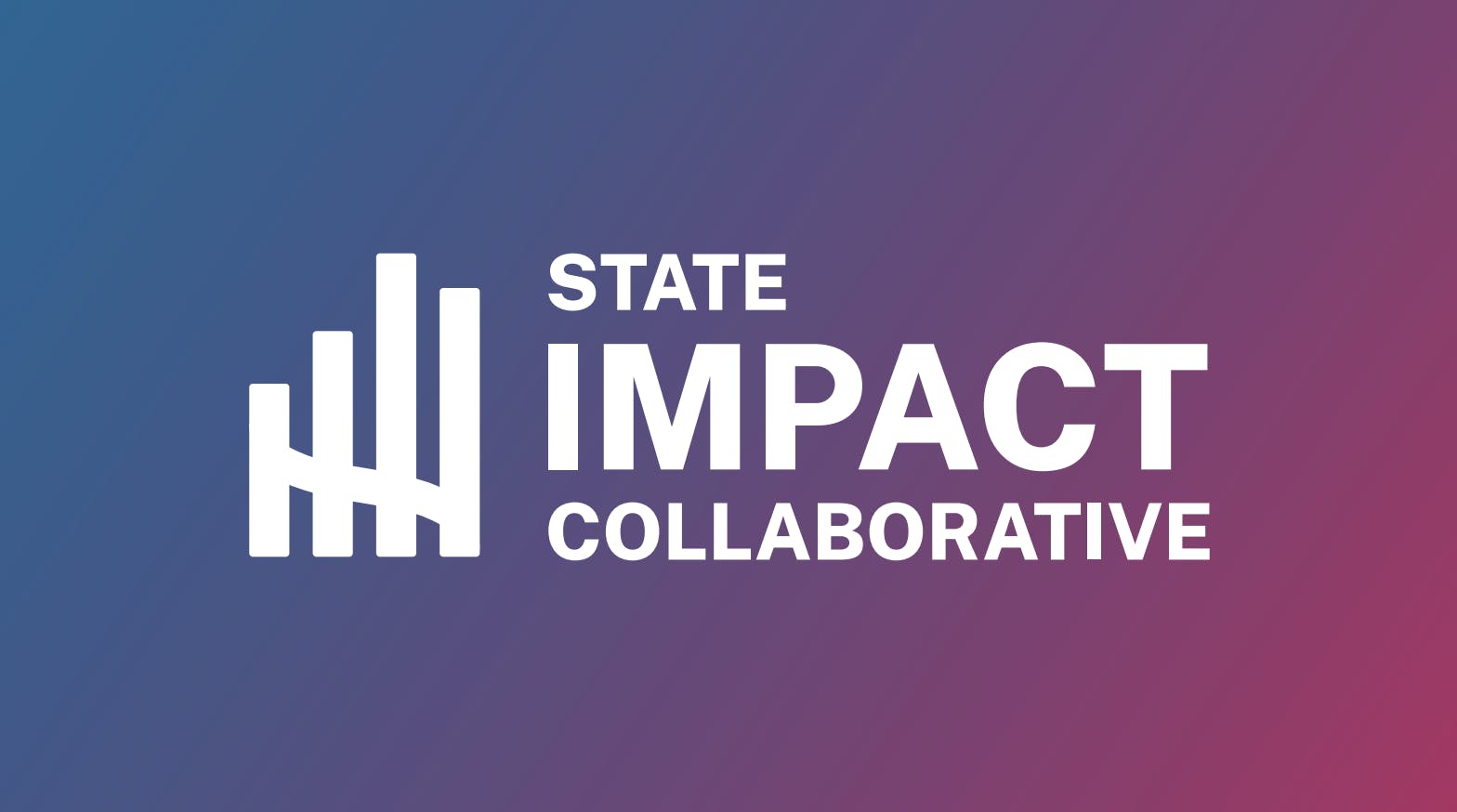
17 Jul 2024
State IMPACT Collaborative Informational Webinar
Join the Coleridge Initiative and MDRC for this informational webinar to learn more about the new State IMPACT Collaborative and how to submit a Letter of Intent (LOI) to participate in the program.
MDRC and the Coleridge Initiative are excited to announce an opportunity for state agencies to conduct a rigorous evaluation of a program or policy modification using their administrative data. We are looking to collaborate with state agencies interested in testing variations in program services such as enhancing a program by adding a new component or enhancing existing services. Tests must be programmatically feasible within a short time frame and have readily available data for measuring outcomes. State agencies will be expected to test variations in economic mobility program services. Proposed tests must target systems, operations, or policies in one of the following domains: workforce development, higher education, income support, housing, and justice programs. This opportunity includes direct funding as well as technical assistance. We are prepared to work with state agency teams across a range of levels of knowledge, skills, and competencies. Some state agency teams may have internal staff capacity to do much of the required data work on their own. Other state agency teams may need more hands-on teaching to complete the data analytics work. Regardless of the state agency’s evaluation and data analytics capacity, we welcome you to apply by August 7th.
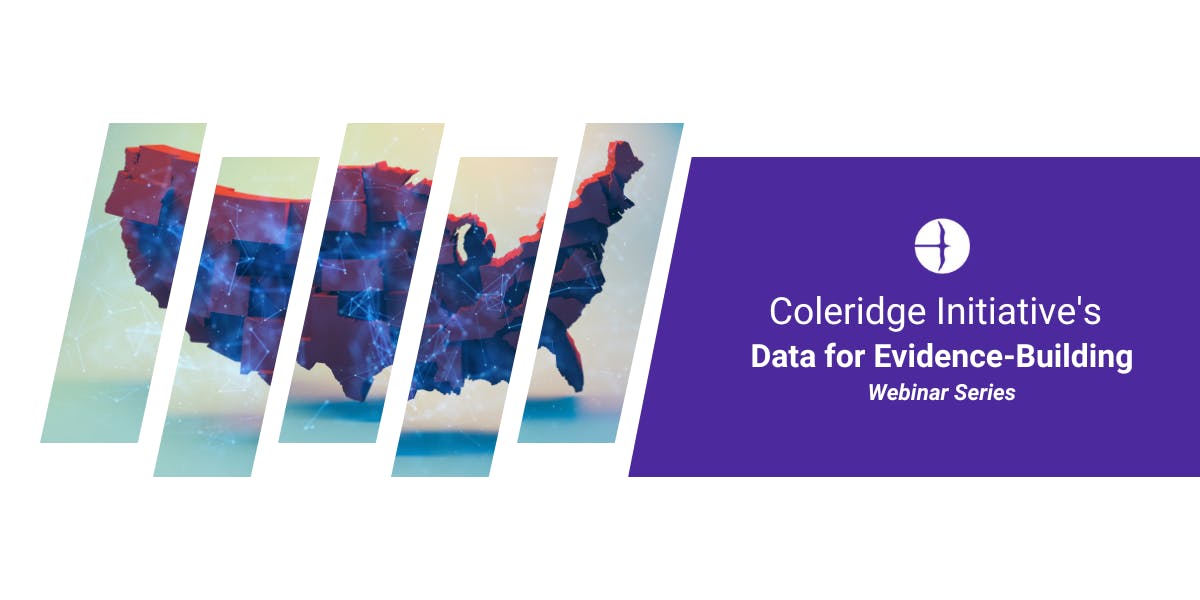
06 Jun 2024
Exploring the Impact of the Value Data Collaborative
Join the Coleridge Initiative, the Institute for Higher Education Policy (IHEP), and representatives from multiple state and higher education agencies to learn more about the Postsecondary Value Framework and how it can inform more equitable and effective higher education policies.
The Value Data Collaborative (VDC) is a data-driven approach to understanding the return on investment in higher education. The VDC uses the Postsecondary Value Framework, developed by the Postsecondary Value Commission, which provides a basis for understanding the return on investment in postsecondary education, particularly by race, ethnicity, income, and gender. In this webinar, participants will learn from state administrators who have implemented the framework within their policymaking processes and gain insights into the challenges they’ve overcome. Speakers from Coleridge and IHEP will also dive deeper to explore the nuances of the framework and discover how it can inform more equitable and effective higher education policies.

22 Apr 2024
Breaking Data Barriers through the Democratizing our Data Challenge
Join Coleridge Initiative's Director of Data Enclave Programs, Jon Mills, and VP of State Programs, Jessica Cunningham, to discuss invaluable insights and experience gained through the Democratizing our Data Challenge in data-sharing agreements, multi-partner collaboration, secure technology, data governance and compliance, and data infrastructures.
The successful design of government policies and practices relies heavily on strategic collaboration between data partners. The Coleridge Initiative’s Democratizing our Data Challenge has enabled the collaboration of multi-partner teams from across the United States to expand existing data products developed in the Administrative Data Research Facility (ADRF) and develop new data linkages, dashboards, portals, APIs, data models, and code repositories. Through the Challenge, we have gained invaluable insights and experience in data-sharing agreements, multi-partner collaboration, secure technology, data governance and compliance, and data infrastructures. In this webinar session, we will provide an overview of the Democratizing our Data Challenge and discuss Round 3 of the Challenge.
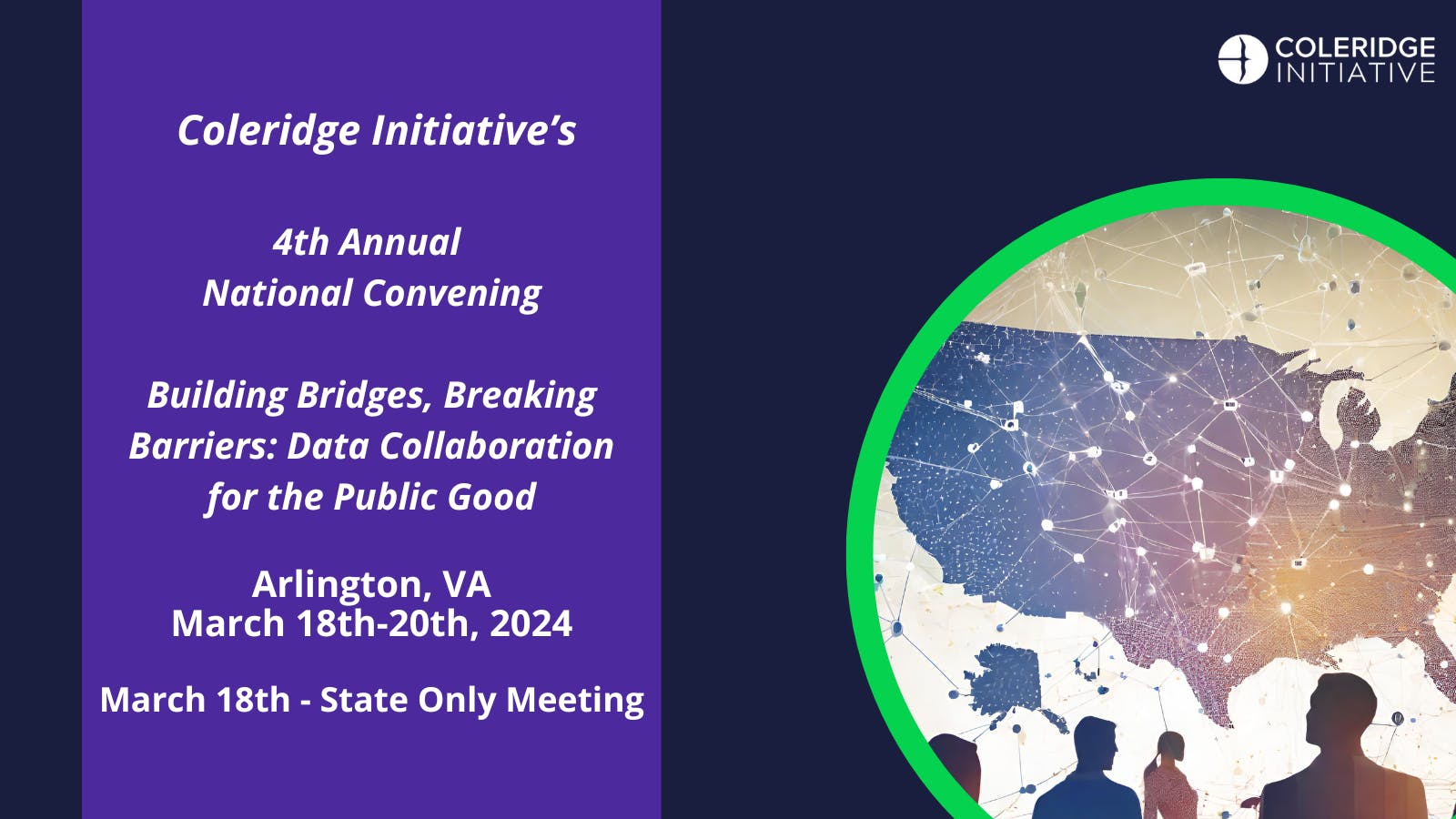
19 Mar 2024
4th Annual National Convening - Building Bridges, Breaking Barriers: Data Collaboration for the Public Good
Join us for the Coleridge Initiative’s 4th Annual National Convening - Building Bridges, Breaking Barriers: Data Collaboration for the Public Good. The Convening will be held from March 18th - 20th, 2024, at the Crystal Gateway Marriott in Arlington, Virginia. Please note that March 18th is reserved for meetings of state agencies, institutions, and entities supporting the Multi-State Data Collaboratives in partnership with NASWA and SHEEO. General registration is closed. If you are a partner and would still like to register, please contact us at info@coleridgeinitiative.org.
In today’s data-driven world, the successful design of government policies and practices relies heavily on strategic collaboration between data partners. Coleridge Initiative’s Annual Convenings are designed to showcase the transformative potential of leveraging administrative data through state, federal, and private collaborations. In this year’s program, we will explore how leaders in the field are pushing the boundaries of traditional governance, forging data partnerships, and reshaping the future of public policy and administration. Attendees can expect to gain insights into how data collaboration can lead to better outcomes in public policy and administration, as well as learn about innovative projects, products, and practices that are driving change in the field. The Convening will feature sessions designed to provide attendees with valuable knowledge and networking opportunities. Some of the highly anticipated sessions include: Fireside Chat - Building Bridges from Data to Public Impact Philanthropic Funding Impacts on Data Innovation and Collaboration Democratizing Data Challenge Gallery Walk Poster Session Employing Strategies for Effective Code Modernization Breaking Barriers through Technology What’s Next with AI? Collaboration for the Future: What’s Next with Upcoming Projects? We invite you to join us for this exciting event and discover how we can work together to leverage data for the public good.
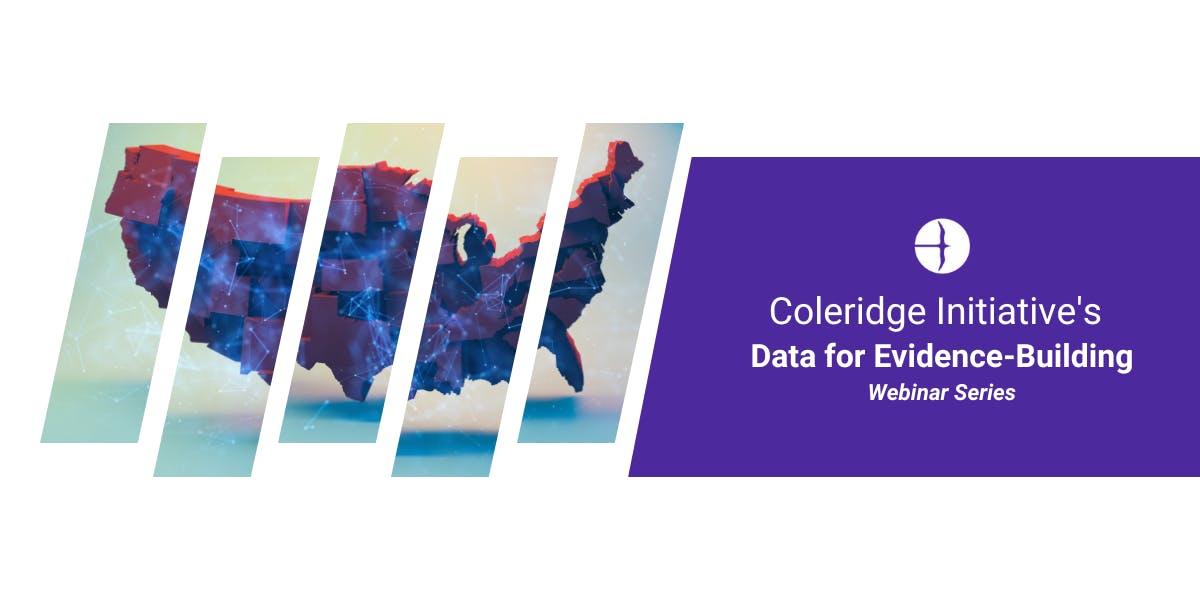
22 Jan 2024
Complex Data Systems and Analytical Approaches: Facilitating Evidence-Based Decision-Making
Join Coleridge Initiative VP of Product and Development, Nathan Barrett, Senior Manager of Training and Data Analytics, Benjamin Feder, and Senior Research Scientist, Corey Sparks to discuss the complex data systems and analytical approaches required to facilitate evidence-based decision-making. 12: 00 PM - 1:00 PM (EST)
Today’s policy questions require increasingly complex data systems and analytic approaches to facilitate evidence-based decision-making. The Coleridge Initiative’s Applied Data Analytics (ADA) training programs are centered around these questions and designed to both build new data infrastructure and the analytic capacity of agency staff. Coleridge's full training program topics are collaboratively developed with partner states and the curriculum is designed to demonstrate concepts through a project-based learning approach. By working hands-on with micro-level data, participants can explore the art of the possible by developing, interpreting, and communicating value-based outcomes. Coleridge is also excited to announce our short course series which takes a deeper dive into core data analytic concepts through the use of micro-level data. In this webinar session, we will provide an overview of our ADA programs, products and insights developed through the training, and an outlook on innovations that can be achieved through our programs.

19 Sep 2023
Access and Discovery of Data for the Public Good
Join Coleridge Initiative CEO, Ahu Yildirmaz, and CTO/CISO, Mahesh Sahore, to discuss the Administrative Data Research Facility (ADRF). 12 PM - 1 PM EST
The Administrative Data Research Facility (ADRF) is an award-winning, secure, cloud-based data hosting platform that enables collaboration between agencies across jurisdictions. With a focus on safe access and use of administrative data, the ADRF provides agency researchers with secure data enclaves that promote collaboration and innovation. During this webinar session, we will explain the pipeline from data ingestion to safe exports while providing a walkthrough of the ADRF including Coleridge's project isolation model and demonstrating how researchers can access their data with R or through DBeaver. We will also present a live demo of the newly launched ADRF Management Portal.
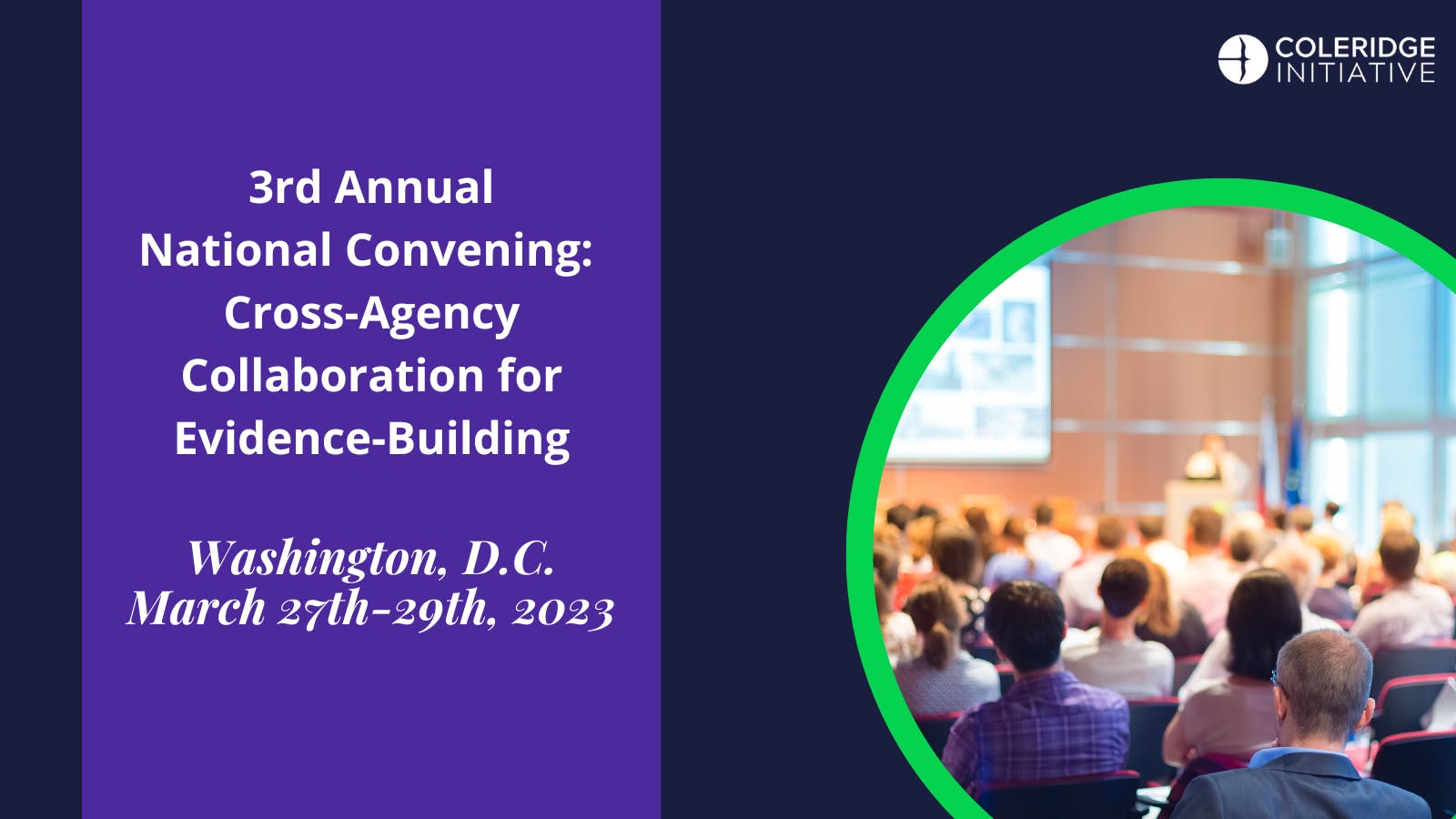
28 Mar 2023
3rd Annual National Convening: Cross-Agency Collaboration for Evidence-Building
The Coleridge Initiative's 3rd Annual National Convening highlighted the transformative potential of collaborations among government agencies and researchers that use linked administrative data to produce actionable insights to improve government programs. The first day of the conference, March 27th, was reserved for an invitation-only meeting beginning at 1:30 PM ET for the Multi-State Data Collaboratives.
States play a critical role in building evidence to improve the impact of federal programs administered at the state and local levels, and should be partners in creating the evidence-building ecosystems needed to leverage federal and state data in ways that benefit constituents, improve programs, and inform policy. This year's conference was intended to spark interest and continue to build upon the interest of federal, state, and private sector organizations to work together to harness the rich government administrative and statistical data as well as private sector data to answer important policy questions. The three-day event featured sessions developed in partnership with the National Association of State Workforce Agencies (NASWA), the National Governors Association (NGA), and the State Higher Education Executive Officers Association (SHEEO). Sessions highlighted state and federal projects working with linked data, state data products being used to inform policy, and the impact of the Democratizing our Data Challenge. Funded by philanthropic organizations, the Democratizing our Data Challenge gave states an opportunity to develop data products and collaborate across jurisdictions through the Multi-State Data Collaboratives. The convening also featured a panel session with leading members in the data community focused on the unique position of states to leverage their data while also collaborating with federal, private, and academic data.
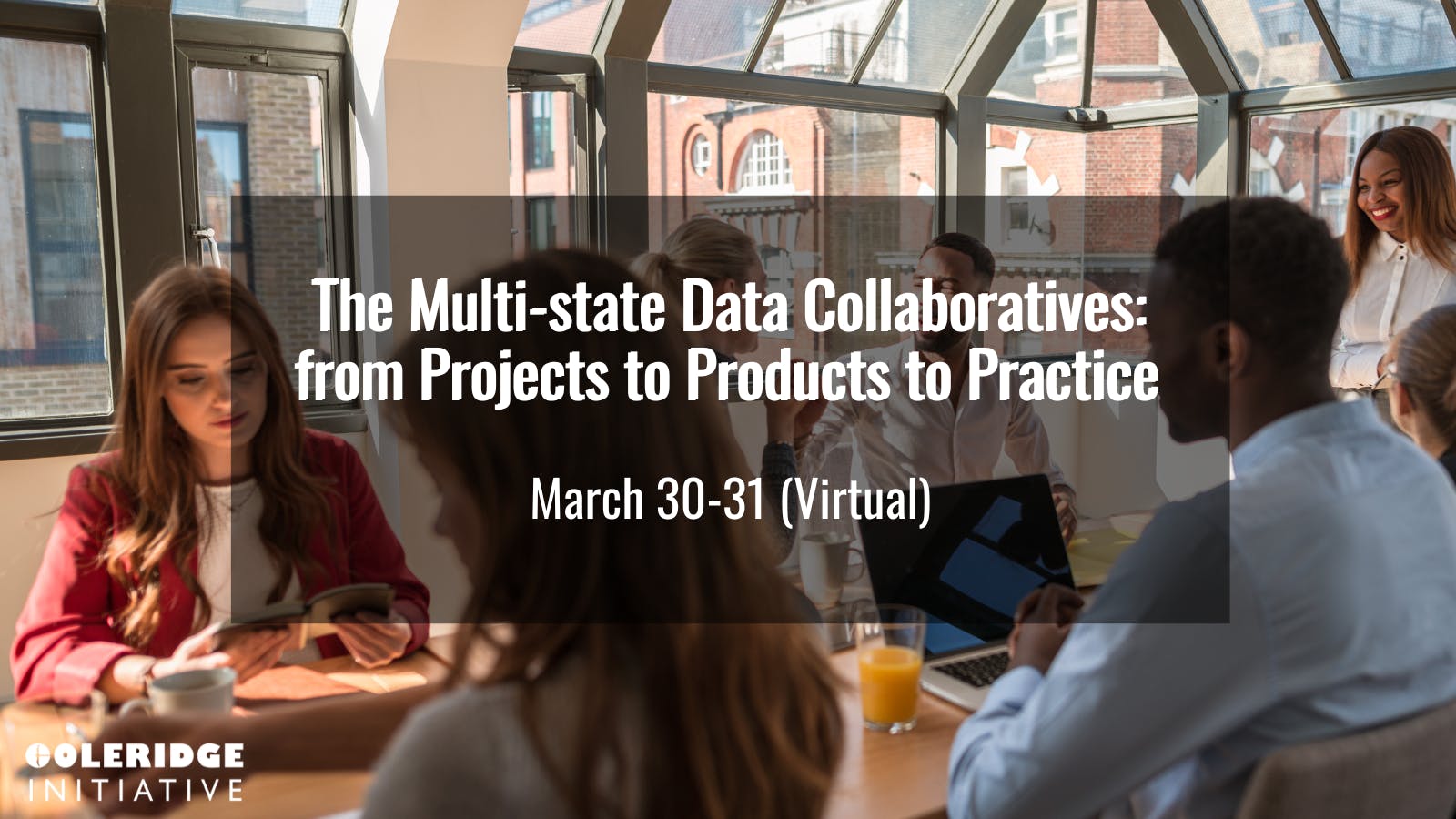
30 Mar 2022
The Multi-State Data Collaboratives: from Projects to Products to Practice Convening
Join leaders from across the country for the Multi-state Data Collaboratives: From Projects to Products to Practice. This year’s convening is a response to the success of the First Annual National Convening in March 2021, the overwhelmingly positive response to the Democratizing our Data Challenge, and the rapid expansion of multi-state data collaboratives.
There is an urgent need for timely, locally relevant, data and evidence that can be used to respond to the changes in the pandemic economy, particularly for low-income learners and workers, at-risk youth, underrepresented minorities, immigrants, and formerly incarcerated individuals. New information can inform policies about investments in education and training, student debt, as well as welfare and corrections programs. Federal, philanthropic, and state partnerships have led to new projects, products, and practice for evidence building. The results are being used by many state Departments of Labor, Education and Human Services. At the National Convening, attendees will both learn about current and proposed projects and products and help set priorities for the future. In partnership with the National Association of State Workforce Agencies and State Higher Education Executive Officers Association, the Multi-state Data Collaboratives: From Projects to Products to Practice convening will introduce the regional collaboratives that are creating networks with national reach across agency and state lines. The convening will showcase the value of new products that have recently been made possible through philanthropic foundations, federal investment, and state agencies including state Departments of Labor, Education, and Human Services, and highlight new and potential partnerships, projects and products that are moving to national scale this year. The convening will also allow us to demonstrate how new approaches can be used to inform equitable decision-making.
03 Mar 2021
National Convening: Jobs Data for Evidence-Based Policy
Join leaders from across the country, representing state and federal governments, as well as philanthropic foundations and professional associations, for a dynamic two-day workshop celebrating success and mapping a strategy to grow data access, stewardship, and analysis for evidence-based policymaking.
The convening will highlight the demonstrated success of a collaboration of state workforce agencies and universities across the country, as well as tangible evidence about the value of state and federal data, and build sustainable state data infrastructure through partnerships and national support. The current COVID-19 outbreak and the resulting employment crisis have made it clear: state and local data are key to understanding and responding to local social and economic challenges. While state data systems end at state borders, there is massive potential to develop the cross-state infrastructure needed to collect, mine and use administrative data; share evidence-based practices; and establish common measures and research tools. LEARN how states have worked together to develop regional collaboratives around a framework of training, shared products, data standards and governance. SHARE your expertise and insights to the development of a national agenda and a sustainable, locally driven, national data infrastructure. GROW the community of data-oriented, evidence-based policymakers and program administrators. ACCELERATE data-driven research and policies supporting program management, policy development, and scholarly research.